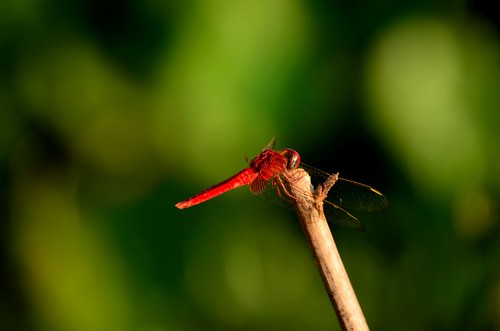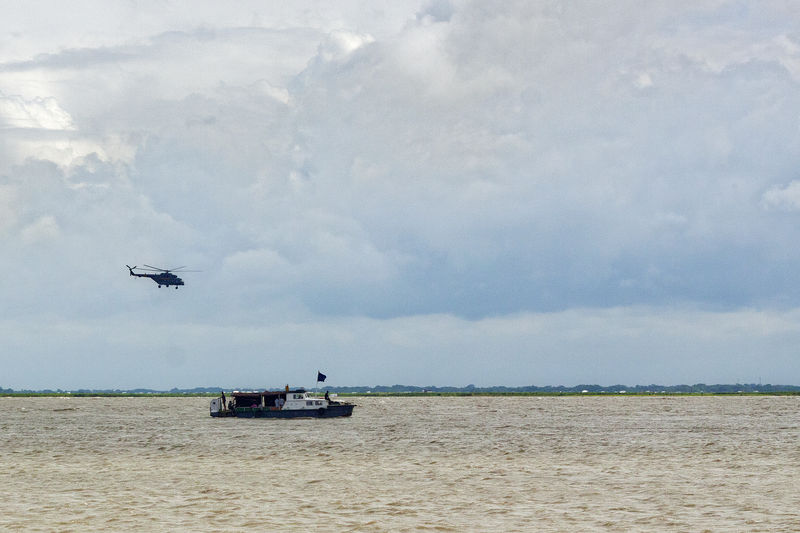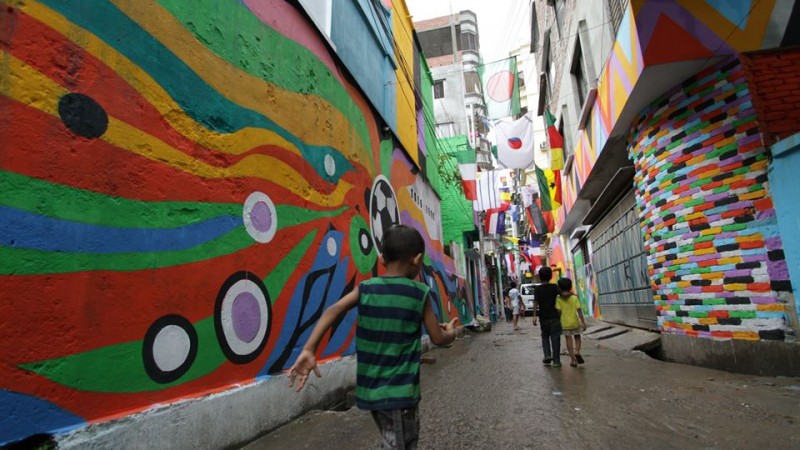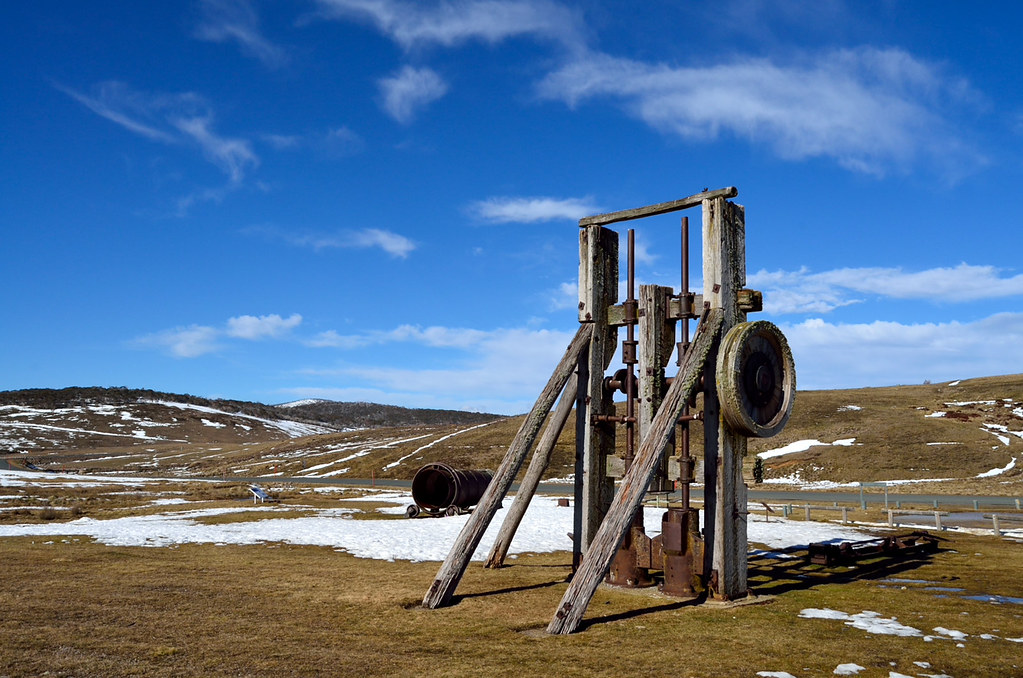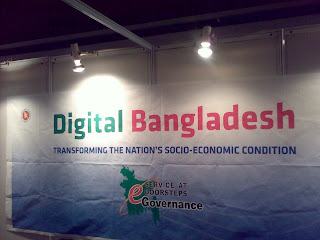Dragonfly
Image by Rezwan
The World Cup Goal-E Project
This street in Bangladesh has a colorful world cup celebration
New Chum Hill Ruins
Remnants of Kiandra gold mine at New Chum Hill, #nsw #australia
December 19, 2010
In this world this edifice has been made, to display thereby the creators glory.
December 18, 2010
The bounty of Bangladesh Team @ #Manthan - 4 Winners, 4 Special Mentions & 1 Jury distinction
December 17, 2010
At The Manthan Awards
More details later.
December 05, 2010
Bangladesh: Grameengate And Beyond

Bangladeshi Nobel Laurate Dr. Muhammad Yunus. Image from Flickr by World Economic Forum. CC BY-SA
The hottest topic in Bangladesh now is the allegation against Nobel laureate Dr. Muhammad Yunus of diverting foreign aid from Grameen Bank to another sister company called Grameen Kalyan. The objective of Grameen Kalyan is to provide financial support in the form of loans and grants to the staff and members of Grameen Bank and their families. An investigative documentary by Danish filmmaker Tom Heinemann titled "Fanget i Mikrogjeld" or "Caught in Micro debt" was aired last Tuesday on the National Norwegian Television (NRK).
Heinemann took a critical look at Microcredit operations in Bangladesh saying that many loan receivers "had multiple loans in various micro credit banks and organizations and had a hard time trying to pay back their loans." In addition he stumbled into some documents from the archives of the Norwegian aid agency Norad which tells that Grameen Bank shuffled donor money to Grameen Kalyan without prior permission of the donors to avoid potential government tax @40%. In an exclusive report the secret documents were published by BDNews24.com, the largest online news agency in Bangladesh. The local media jumped on this story and the bloggers are divided on this issue.
The Grameen Bank response denied any wrong doings.
Asif at Unheard Voice provides the outline of the arrangement of Grameen Bank and discusses about the impact of the documentary:
1. Donors (Norad et al) gave a large cash grant to Grameen Bank (GB)
2. Instead of paying back interest or principal, GB was to put aside 2% of those funds for employee welfare projects (SAF)
3. GB was afraid of a regulatory change levying 40% tax on that outflow and wanted to give SAF the “attention it deserves”
4. So GB created Grameen Kalyan (GK), gave them a large amount of cash and borrowed it back at 2%
Norad‘s problem was that:
1. GB never told them about this particular piece of legerdemain they happened to find out almost by accident (the bdnews24 story has a few PDF files of those communications)
2. Their memorandum of understanding was with GB and the Bangladesh Government about the use of the 2% for SAF, not with GK, so this left things in the kind of vacuum they wouldn’t be comfortable with
The documentary claimed as much as USD 100 million had been siphoned away and — notwithstanding Norwegian claims that Yunus is not corrupt — led to lurid claims in Bangladesh media like Yunus ‘siphoned Tk 7bn aid for poor’. GB’s detailed riposte notwithstanding, the damage has been done.
Journalist and blogger Maskawaith Ahsan defended [bn] Dr. Yunus in a post titled "In a media coup by Norway Dr. Yunus killed in Dhaka":
অধ্যাপক ইউনুসের বিরুদ্ধে ইউরোপের অর্থ গ্রামীণের বোন সংস্থায় ট্রান্সফারের যে অভিযোগ উঠেছে, তা উনার অর্থ বিষয়ক স্পর্শ কাতরতার ফলাফল। ওই অর্থ দিয়ে ইউনুস ভূমধ্যসাগরের তীরে প্রাসাদ তৈরী করেন নি, সেটি গ্রামীণের বোন সংস্থায় বিনিয়োগ করা হয়েছে। তবুও এটি দাতাদের সঙ্গে চুক্তির বরখেলাপ।
The accusations against Dr. Yunus of transferring European money to a sister concern is the result of his sensitiveness with finance. He did not build a palace in the Mediterranean, it was invested instead. Still it was against the agreement with the donors.
Baki Billah writes:
এটা একটা পদ্ধতিগত সংকট হতে পারে কিন্তু তার সাথে চৌর্যবৃত্তির সূত্র আবিস্কার করার মৌলিক কোন বিষয় আছে কি ? প্রামাণ্যচিত্র নির্মাতা টম খুব সরলে এ প্রশ্নের উত্তর দিয়েছেন, তিনি বলেছেন, অনেক চেষ্টা করেও তিনি ইউনুস সাহেবের সাথে যোগাযোগ করতে পারেন নি। তিনি কিভাবে চেষ্টা করেছেন?
This could be a procedural fault, but is there any reason to malign him with theft of money? The documentary maker Tom answered the question simply by saying that he could not contact Mr. Yunus for his response after repeated attempts (editors note: for 6 months). How did he try?
In another post of Maskawaith Ahsan, a commenter named Netpoka comments:
দাতাদের দেওয়া টাকা সরিয়ে নেওয়ার যে অভিযোগ উঠেছে, তাতে কেবল ডঃ ইউনুসকেই দায়ী করা হচ্ছে। অথচ গ্রামীণ ব্যাঙ্কের একটি বড়সড় পরিচালনা পর্ষদ আছে, যাতে প্রতিনিধিত্ব করেছেন রেহমান সোবহানের মত ব্যক্তিগণও। অর্থ সরানোর দায় তো তাদের সকলেরই হওয়ার কথা!
আর দাতাদের দেওয়া টাকা থেকে এক টাকাও তিনি নিজের ব্যক্তিগত কাজে ব্যয় করেছেন কি? শুনেছি আজ পর্যন্ত তাঁর নিজের একটি মাথা গোঁজার জায়গও নেই - থাকেন গ্রামীণ ব্যাঙ্ক ভবনের একটি ফ্ল্যাটে। অথচ তাঁকে এখন বলা হচ্ছে দুর্নীতিবাজ।
নরওয়ে এবং টেলিনর কেন ডঃ ইউনুসের পেছনে লেগেছে, তা সবাই জানে। তারপরও আমরা তাঁকেই ভিলেন বানাই।
The accusation of transferring donor money is being directed to Yunus only. But Grameen Bank is run by a big management committee where reputed people like Rehman Sobhan are also there. The accountability should be demanded from each one of them.
And did he ever spent a Taka for his own self? I heard that he even do not own a house - he stays in a flat provided by Grameen Bank. And now they accuse him of corruption.
Everybody knows why Norway and Telenor are after him. Then why are we making him the villain?
It may be noted here that a few years ago Yunus had a fight with Norwegian Telecoms giant Telenor (majority owned by Norwegian government) over management control of Grameenphone, Grameen Bank's joint venture. Yunus wanted to convert Grameenphone, the leading and profitable Telecommunication company in Bangladesh, to a social business enterprise [where profits are reinvested in the company rather than taken out], but Telenor did not accept. The Norwegian Telenor was later caught in a labor scandal.
Shuvashish Das posts a detailed analysis [bn] on this issue trying to explain why after 12 years the issue has been exposed to media:
২০১০ সালের মাঝামাঝি থেকে গ্রামীণ কল্যাণের অর্থ গ্রামীণ ব্যাংকে স্থানান্তরের জন্য সিডা, নোরাড আবার চাপ দেয়। ৬০৮ মিলিয়ন ক্রোনার (এর মধ্যে ৩০০ মিলিয়ন দেয় নোরাড, বাকিটা অন্যরা) গ্রামীণ ব্যাংক থেকে চলে গেছে গ্রামীণ কল্যাণে। অথচ ফেরত এসেছে মাত্র ১৭০ মিলিয়ন। বাকিটা এখনো গ্রামীণ কল্যাণে থেকে গেছে।
২২ আগস্ট ২০১০
গ্রামীণ ব্যাংক একটা ইমেইল দুটি ব্যাখ্যা জানায়-
গ্রামীণ ব্যাঙ্কের কর্মী আর সদস্যদের উন্নয়নের জন্য এই অর্থ স্থানান্তর।
গ্রামীণ ব্যাংক গ্রামীণ কল্যাণে কর ফাঁকি দেয়ার জন্য অর্থ স্থানান্তর করেনি। কারণ ১৯৮৩ সাল থেকে গ্রামীণ ব্যাংককে কোনো কর দিতে হয় না।
CIDA and NORAD started again in mid 2010 to pressure Grameen Bank to transfer the donor loan from Grameen Kalyan. 608 million Kroner (300 mill by NORAD) was moved from Grameen Bank but only 170 million Kroner was refunded till to date. The rest of it still lies with Grameen Kalyan.
22nd August 2010
Grameen Bank explained in an email -
The money was transferred to provide support to the staff and members of Grameen Bank and their families.
Grameen Bank did so not to avoid taxes because Grameen Bank operations are exempted from tax since 1983.
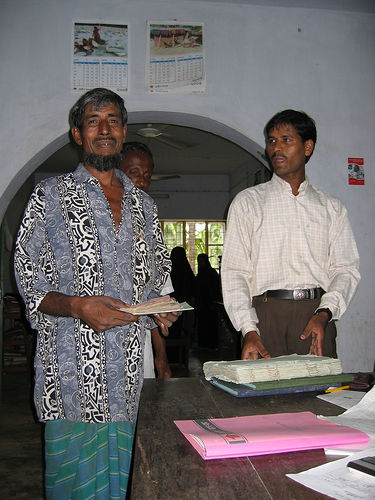
Poor bangladeshi receiving loan (w/o collateral) from the Grameen Bank. Image from Flickr by Jeevs Sinclair. CC BY-NC-SA
In the end Shuvashish asks some valid questions:
বাংলাদেশের ক্ষুদ্রঋণ সংস্থাগুলো ২০ থেকে শুরু করে ১০০% বা তারও বেশি সুদ নেয় গরিব মানুষের কাছ থেকে। ক্ষুদ্রঋণ দারিদ্র্যকে হালকার ওপর ঝাপসা প্রশমিত করে দীর্ঘমেয়াদি করে। উচ্চসুদের কারণে গরিব গরিবিমুক্ত হওয়ার সুযোগ পায় না। কিছু কামেল লোক হয়তো বেরিয়ে আসতে পারে। ঋণের যাঁতাকলে দীর্ঘমেয়াদে আটকে গেছে এমন লোকের পরিসংখ্যান জানা জরুরি। ক্ষুদ্রঋণ কেবল ভালো ভালো জিনিসগুলো পাবলিককে দেখায়, পেছনের বাজে দিকগুলো লুকিয়ে রাখে। এসব সমালোচকের দৃষ্টিতে দেখা প্রয়োজন। গ্রামের মানুষের টাকা নাই, তাদেরকে ঋণ দেয়া একটা ভালো ব্যবস্থা; কিন্তু ঋণের চক্রে ঢুকিয়ে দেয়া অমানবিক। [..] সরকারকে কর দিতে হয় না বলে দেশে প্রায় চার হাজারের মতো ক্ষুদ্রঋণ ব্যবসা। ২৫ থেকে ৩০ হাজার কোটি টাকার মতো ঋণ বিতরণ হচ্ছে প্রতি বছর। সহজে মুনাফা অর্জনের জন্য এর চেয়ে ভালো ব্যবসা আর নেই। সরকারের উচিত এদের উপরসর্বস্ব ভালো কথাগুলো খতিয়ে দেখা। আর নরওয়ে উদ্দেশ্যমূলকভাবে এই আচরণ করলে সেটারও বিহিত হওয়া দরকার।
Many Microcredit organizations (Editors note: not only Grameen) claim interest from 20% to 100% from the poor loan clients. Microcredit minimizes poverty upfront, but prolongs it. The poor cannot get out of poverty because they have to pay high interest. In reality only a small portion may get out of poverty. We need to learn about the statistics of those people who are stuck in the cycle of debt. Microcredit only focuses on successes but tries to hide the failures. One has to look at it with a critical viewpoint. The rural poor do not have money, so providing them with loan finance is a good thing. But letting them into the cycle of debt is inhuman. There are more than 4000 Microcredit organizations running in the country because they don't have to pay tax. Every year 250 - 300 billion Taka ($3.5-$4.2 billion) are being disbursed to the poor. There is no other business than this to make easy money. The government should investigate these operations. And if Norway is deliberately doing this (to Yunus), this should also be investigated.
(Also published in Global Voices Online)
November 24, 2010
"An idea must come from somewhere, because if it merely stays where it is and doesn't join us here, it's hidden. And hidden ideas don't ship, have no influence, no intersection with the market. They die, alone." - Seth Godin - where do ideas come from?
November 07, 2010
November 06, 2010
The mighty Padma (Ganges) reduced to a tributary
Mobile Service
In the picture a street shop in Rajshahi town offering mobile telephone service @ BDT Tk. 2 (US cent 3). I arrived here yesterday.
November 02, 2010
The overbridges are in wrong places
In my opinion underpasses can also ensure smooth flow of traffic in the crossing areas.
However the voices of me and this traffic Policeman will remain unheard and we will continue with our daily struggle because the policy makers will not listen to us. This is the sad reality.
October 27, 2010
CNG losing its potential as fuel alternative in Bangladesh
Compressed natural gas (CNG)as a vehicle fuels was first introduced to Bangladesh in 1982 through a World Bank pilot project. In 1999, four private companies obtained permission to set up about 5 stations each (source).
This "greener" fuel alternative has sunken the transport cost for many vehicle owners. The high price of conversion of Engine (Tk. 56000 eq. US$800) did not deter many people from using this as fuel cost becomes 5 to 10 times cheap when using CNG. Moreover, it provides clean air by reducing harmful emission.
The government vehicles are gradually being converted to CNG. Many public transports including buses are fueled by CNG and autorickshaws in Dhaka are compulsorily powered by CNG. When Bangladesh government banned the Two-stroke autorickshaw engines in 2003, there was a 30 to 40 percent drop in particulate pollution in Dhaka.
Natural gas is supposed to be Bangladesh’s only significant source of energy. So the CNG sector had a promising future. But suddenly everything seems to be stalled. The CNG sector is running into crisis according to Energy expert Kh.A.Saleque:
* There are allegations that without making proper feasibility study authorities through corrupt practice accelerated permissions for setting up CNG filling stations in already saturated areas.
* The massive growth of CNG re-filling stations in already congested gas distribution networks have created additional burden on the main gas distribution net work.
* The Government served double blow to CNG by al most doubling feed gas price to CNG and increasing CNG price significantly in one step.
In year 2002, there were only five CNG filling stations in Dhaka. By 2005 it grew to 75 and now approximately 500 stations are operating. CNG refueling stations consume only 5 per cent of the gas production. Approximately 300,000 of the 1 million vehicles on the road are now CNG-fueled. A typical CNG station is equipped with a double hose dispenser with two double nozzles and would serve between 300–500 cars in 16 hours station access time. So there is already a demand of 500 more stations to provide smooth CNG refueling service.
The government has recently banned CNG stations from selling CNG from 3PM to 9PM. This has created long queues in the filling stations forcing many vehicle users to opt for gasoline consumption instead.
I share with you one bitter experience of mine which I faced last Saturday. The CNG autorickshaws in Dhaka was a good transport option back in 2004-2005 when it ran on meter and there was a law that they should go everywhere where the passenger wants to go. But now it is completely a mess. They don't run on meters, will not go everywhere and the passengers has to agree to exorbitant price when they have no alternative. I started from Paribagh towards Gulshan 2. The CNG driver requested me to allow him to refuel his CNG tank as 3PM was approaching and there will be no refueling for next 6 hours. But at the end it cost me 40 minutes (equivalent to journey time) as he had to be in a long queue in a CNG station. Who is responsible for the loss of opportunity cost of him and mine?
The Owners of CNG refueling stations is protesting the Petrobangla move to raise the CNG price by sending a proposal to the Bangladesh Energy Regulatory Commission (BERC). The price rise will be from Tk 16.53 (25 cents) to Tk 25 (36 cents).They will go on strike from the 1st of November as the banners and posters say. The common citizen will suffer and more and more people will switch back to gasoline which will be a sad ending to a happy story.
October 25, 2010
Land Grab And Protests In Bangladesh
The population of Bangladesh is increasing and there is a growing demand of land mass for housing. As it is already considered a densely populated country, finding empty lands for development of housing complexes can be a tough ask. Political and business powerhouses grab government and private lands and the security forces or the law can barely do anything to protect the rights of general people.
Shahjahan Siraj describes in a podcast report at Panos London how land owners are turning beggers because of land disputes:
Disputes over land are the biggest single cause of court cases in Bangladesh. It’s usually the rich and powerful who win.
Recently in the Rupganj Upazilla near capital Dhaka Bangladeshis saw another kind of land grab. Protests of land-owners turned deadly as more than 50 people were injured and one person died (three more reported missing) from the clashes with the security forces. At least 10000 people were demanding cancellation of the government decision to acquire about 5,000 bighas (appx. 1653 acres) of land in Rupganj for an army housing project. The police has brought charges of vandalism against approx. 4000 people as they torched an army camp.
According to media reports [bn] the army had established 4 camps in Rupganj Upazilla 6 months ago and were carrying out the land acquiring tasks from there. Locals said that the personnel from these camps were forcing them to sell off their land very cheaply.
The Inter Services Public Relations (ISPR) in a press release alleged that a vested group has instigated landowners and local people through spreading 'hostile' and 'fearful' rumors against army and the army housing project in the area. They denied about the existence of army camp naming them temporary offices manned by army officials to facilitate the project.
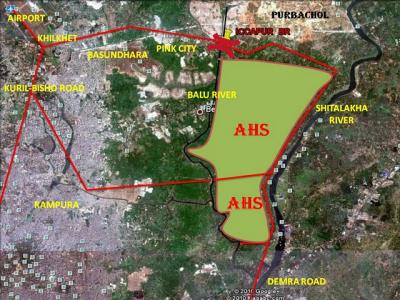
Some bloggers are reacting with anger over this incident. Blogger Dinmojur at Somewherein Blog writes in details about the army housing project (AHS) and how the army approached with the difficult task of acquiring so much land (1653 acres) for the project:
জমি কেনা বেচার সামান্য অভিজ্ঞতা যার আছে, তারা সহজেই বুঝবেন, একসাথে এত জমি কখনই সেচ্ছায় মানুষের কাছ থেইকা কিনা যায়না। ভিটাবাড়ি, পারিবারিক কবরস্থান এবং টিকে থাকার একমাত্র অবলম্বন কৃষিজমিটুকু কে-ই বা স্বেচ্ছায় বেচতে চায়! [..]
ফলে আর্মি তেরছা রাস্তা ধরলো। [..] ইউনিফর্ম এর জোর দেখায়া তারা ২৪ টি মৌজায় সব ধরণের জমি কেনা বেচা বন্ধ কইরা দিল। তাগো সাফ কথা, জমি যদি কেউ বেচতে চায় তাইলে সেনাবাহিনীর কাছে বেচতে হইব। আর জোর জবরদস্তিই যখন করতেই হইল তখন আবার ন্যায্য দাম কিসের?
Those who have the faintest idea of buying and selling land knows one can never purchase all that land together without force. Not everyone will want to sell their ancestral house, family graveyard, and their means of livelihood. [..]
So the army took the hard path. [..] Showing their power of uniform they stopped all buying-selling of land in 24 Moujas. They had only one demand - if anybody wants to sell land then they will have to hand it over to the army. And as they had to assert power why buy at a fair price?
The blogger posts evidence that the formal approval for the project from the land authorities is still pending. But the AHS project has already received payment of installments from potential buyers - many army officers for this project. The blogger also points to the advancing business interests of Bangladesh army. A recent BBC documentary showed how Bangladesh army has become a big conglomerate.
However, blogger Osthir Prithibi has questioned the hyped criticism and negativity against the army and requested not to jump into conclusion without much information.
Blogger & journalist Maskwaith Ahsan at Somewherein Blog vents his frustration on the politics behind the incident and the blame game:
এখনো আমরা চালাক মানুষরা ভাবছি,আগুন লেগেছে রুপগঞ্জে। আমাদের কী। আগুন কতো দ্রুত আপনার চৌকাঠে আসতে পারে তাতো জানিনা আমরা। আমাদের বালিতে মুখ গুজে দেশপ্রেম বিলাসের নিষ্কর্মতায় আমরা নূরহোসেন, রিসিল, জামালদের লাশের অংক কষে যখন ব্রেকিং নিউজ দেখছি,
তখন যুদ্ধাপরাধীরা রুপগঞ্জের ঘটনাকে কীভাবে ঘোলা করে যুদ্ধাপরাধীদের বিচার পন্ড করা যায় তার রেসিপি তৈরী করছে।বিএনপি এখন ত্যানা পেচিয়ে আওয়ামী লীগকে অজনপ্রিয় করে তুলবে। কারণ বিএনপির শয়নে সপনে জাগরণে শুধু ক্ষমতায় যাওয়া। দেশের চেয়ে দল বড়। মানুষের চেয়ে জমি বড়।
We clever people still are contemplating - there is fire in Rupganj, so what! We don't know when this fire will spread in our houses. We stick our head in the sand in leisure and inaction and watch the breaking news counting..Nur Hussain, Richil, Jamal.. all these dead bodies...
Then the war criminals will try to exploit this incident to stop the trial against war criminals, BNP (opposition party) will try to shed some popularity of Awami League (ruling party). Because the only goal of BNP is to come to power again. The party is greater than the country. And of course the land is greater than the people.
Mustak Khasru at Somewhere In Blog writes [bn]:
ষোল কোটি চৌচল্লিশ লক্ষ মানুষ যে দেশে বসবাস করে সেই দেশে ভুমি অধিগ্রহনের জুজুটি আইন করে বন্ধ করে দিতে হবে। [..] কৃষি নির্ভর দেশের আবাদী জমির পরিমান জ্যামিতিক হারে কমছে তা এখনি বন্ধ করতে না পারলে সামনে মানুষ মানুষের মাংশ খেতেও দ্বিধা করবে না।
The law of acquiring land in the country of 166.4 million people should be repealed. The cultivable land in this agriculture based country is decreasing exponentially. If we can't stop it people will be hungry and turn carnivorous.
The protests of Rupganj perhaps has made Bangladeshis realize that the lower middle class has overcome the fear of army in this democratic country but the weary middle-class has to wake up.
First published in Global Voices Online.
October 24, 2010
Walkman (1979-2010): The End Of An Era
I remember, it was in 1985 when I first used one of these and it soon changed the way I listened to music. The mp3 players (and now my smartphone) have only emerged in the past decade. I had fun with it and interesting is that it is probably lying somewhere among the junks a boy produces to reminisce after decades.
Its sad to hear that Walkman will no longer be produced by Sony after selling 200 million of these cassette tape models. However, the company will still be manufacturing manufacturing CD and memory module based Walkmans.
The device was built in 1978 by audio-division engineer Nobutoshi Kihara for Sony co-chairman Akio Morita, who wanted to be able to listen to operas during his frequent trans-Pacific plane trips. (Metafilter)
Thank you Walkman, you were a trend setter.
Image courtesy: Crunchgear
October 18, 2010
Goodbye Jakarta
More details will follow. I am on the way to airport now. And for Jakarta,it was interesting living here.
October 10, 2010
At Duck King
October 06, 2010
October 05, 2010
Shahabuddin Ahmed: Painting Bangladesh With His Heart And Mind
One of the most renowned Bangladeshis painters in the world is Shahabuddin Ahmed. He was born in 1950 and studied at the Academy of Fine arts. In 1971 he joined the Liberation war for Bangladesh and fought for independence. Later Bangabandhu Sheikh Mujibur Rahman learnt about his painting skills and met him. He told him to go to Paris and learn painting like Picasso, Van Gogh et al. His life cherished desire was to become a Zainul Abedin, the master painter of Bangladesh, who was also his mentor. In October 1974 he went to Paris to study painting on a scholarship and has been sharing his time between France and Bangladesh ever-since. He comes to Bangladesh regularly to stay, paint and to exhibit. He lives with his wife Anna Shahabuddin and they have two daughters named Chitra Shithi and Charyapad Shahabuddin.
Shahabuddin's works are displayed in many galleries across the globe including the Olympic Museum in Lausanne, Switzerland and Bourg-en-Bresse Museum France. In 1992 he received the 50 Master painters of contemporary arts, Olympiad of the Arts, Barcelona, Spain. In Bangladesh he received the Independent Day Award (Shwadhinata Puroskar) in 2000.
Here is an introduction of his art work from The Arts Trust. Some excerpts:
Shahabuddin’s works reflect contemporary life and times. Its essence glorifies life’s struggle-he fought an actual battle for the liberation of Bangladesh-with victory in the end, transcending time and space. With great erudition and skill, he relies heavily on the power of motion as his mode of artistic expression. His endeavour to unravel the mysteries of the cosmos through the use of colour – most often monochromatic with splashes of bright unusual colours – canvas and brush has perfectly amalgamated life and art. [..]
What has made Shahabuddin, who has been greatly influenced by Francis Bacon and the European movement, to be one among the 50 best painters of the world? His baroque like figures turned towards space seeking light and energy, are a strange mixture of Western influence rooted to his place of origin. He emerges as an international painter with an unmistakable individuality.
Here is a review of his 27th solo exhibition which took place last year in Dhaka. You can view some of his paintings in The Arts Trust Website and in Bangla Gallery. Here are more of his paintings on auction.
I was watching an interview of him in a Bangladeshi TV channel and I was very inspired by his words. What I found disheartening that Shahabuddin Ahmed does not have any website of his own. I hope someday we will see his work and words reaching every corner of the world via his website/blog.
Image courtesy Bdnews24.com and other sites.
September 30, 2010
Blog Action Day 2010
Blog Action Day is an annual event that unites the world's bloggers in posting about the same issue on the same day. The aim is to raise awareness and trigger a global discussion around an important issue that impacts us all. This year's theme is 'water'.
Please register your blog here and participate on October 15th, the blog action day.
September 27, 2010
September 23, 2010
September 19, 2010
An example of citizen media
In Bangladesh citizen media is yet to flourish. Now in the age of audio and video technology in our hand (cellphone, digital camera etc) we should be seeing more instances like this video depicting the anomalies in our societies and systems:
[In this video: a student is being tortured by a teacher of Notre Dame College in a very uncivilized way.)
And the job of citizen journalists are not to create sensations or make judgment on any piece of evidence. It is the job of the media and the society to take the issues forward and resolve the problems the citizen journalists expose. I wish I could see any Bangladeshi media investigating this incident and make a full report of it.
September 18, 2010
September 16, 2010
Why we need online RSS reader clients
Ever since I started to use rss readers it changed my life. Earlier I used to read newspapers regularly by actually going to the sites. But instead I subscribe to certain newspapers and certain keywords in Google search and I can follow news or opinions targeted to a specific region or community at ease.
However, it seems rss could not appeal to many people who want more dynamic and updated information. Twitter, Facebook etc. provided them with more real time information withing the community. I have nothing against them but have doubts whether they will ever cater my special needs as Twitter updates are not stored somewhere to get hold on to. Your only option is to search and you get information overload and might miss the actual news.
I didn't even notice that people are talking about the death of rss readers. I realized after Bloglines announced that it is going to shut down on 1st of October, 2010. I should have seen it coming as there were reports suspecting the demise of Bloglines.
Bloglines quoted Steve Gillmor as a reason for their decision:
..being locked in an RSS reader makes less and less sense to people as Twitter and Facebook dominate real-time information flow. Today RSS is the enabling technology – the infrastructure, the delivery system. RSS is a means to an end, not a consumer experience in and of itself. As a result, RSS aggregator usage has slowed significantly, and Bloglines isn’t the only service to feel the impact.. The writing is on the wall.
And more so it struck to me as I tried to switch to a suitable rss reader replacement. I already use Google reader for monitoring Rising Voices Projects and keeping an eye on the development of new media in general. So I have tried for other online rss reader options (to access from anywhere) and found that Wasabi, Rojo, Newsgator - these services does not exist anymore. Pluck went down in 2007 and the rest of them followed.
Now we need to give a serious thought on what should be the way forward. Why should I invest my time in Google reader if it is going to shut down in near future? Mathew Ingram argues that rss is not dead, but but merely evolving. But we need more online based services so that we do not feel like we are pawn to Google's free service monopoly.
Does anybody have a suggestion which online rss reader client can I use except Google Reader?
September 09, 2010
The Eid Exodus
In comparison: The city crowds going back to their home towns and villages during Eid Holidays -
In Bangladesh
Courtesy Facebook user Baakbakum
In Indonesia:
Image courtesy Megatriks99
In Indonesia this tradition of going home during the Eid holidays is called Mudik.
Tomorrow is Eid-ul-Fitri in Indonesia and the exodus has started a couple of days ago. 2.2 million out of a population of 9.6 million are expected to leave Jakarta this week.
September 06, 2010
September 05, 2010
September 04, 2010
Ganesha in celuk, Bali
Today is a bit overcast but looking forward to a rainless day as we head towards Kintamani hill area. We arrived yesterday via Air Batavia, Indonesian domestic airlines. The experience was not bad as expected. Atleast we had plenty of Legroom. The hotel in Kuta beach was ok.
Will keep you posted.
September 02, 2010
How To Protect Bangladeshis From Cyberstalking
Time and again we have heard stories about how women and kids and even men are being stalked online in Bangladesh. As internet is new to the Bangladeshi societies and most of the users are young and in their teens they do not take any precaution in their engagement.
Just today I was reading an article about how e-stalking is thriving in Bangladesh. Examples include:
- Faking a Facebook account and posting obscene pictures
- Threats on Cell phones
Cyber bullies use text messages on cell phones, or email, instant messages, social networking blogs, or Web pages to harass, embarrass, and intimidate other kids. The bullying takes many forms, from spreading false rumors and posting embarrassing pictures of others to sending offensive messages, repeated harassment (sometimes sexual), stalking, threats, and even extortion. (Cyber Bullying - anti social behaviors online)The problems multiply when the victims hide the fact from their parents and are subjected to stress and depression.
And the media is only talking about the threats and not the naivety of the users in not talking the proper precautions while interacting online.
But these problems can be avoided if the online users be a lot more cautious in their approach. If they can maintain these precautions then I think they can escape a lot of trouble down the line.
Protecting yourself online:
- Protect your identity: When opening a facebook or blog account, do not use your full name - Use nick name or a fabricated stylish name - your friends will know you - so no need to give stalkers a head start.
- Protect your account in Facebook: There are privacy controls - you can fix what type of friends can see what - for example - make some friend profiles - allow everything for best friends and family members- allow limited contents for class and coursemates - allow the minimum possible for new friends.
- Register your birthdate - but do not put the actual year. For example if your birthdate is 3rd April 1986, you register as 3rd April 1975. You will still get birthday wishes from your friend - but the stalker will not be able to assess your age.
- Use photos cautiously: I do not usually upload my or my family photos in Facebook or blog. If I ever do it I do it cautiously - limiting access to family members and close friends only. So use minimum photos and try to use photos without face - side view, blurred images etc.
- And more importantly don't put friends photos and tag them without their consent. If you find your photo is tagged - go and untag it if you feel you friend is not using privacy control and its not safe.
- Do not and I repeat do not put your address or telephone numbers online - in Facebook, in forum emails or other sites. You can write about your location like this - Dhaka, Bangladesh. But not like Dhanmondi, Dhaka. In Facebook if you are an advanced users you can limit who can access your telephone numbers - if you require this.
- Be careful before opening emails. Do not open attachments until you realize that the mail is from a friend and is important for you.
- Here are information on how to set privacy control in your Facebook site
- Controlling How to Share
- Recommended Facebook settings
- 10 Solid Tips to Safeguard Your Facebook Privacy
Protecting your identity on Mobile phones:
- Do not give your phone number indiscreetly
- If you receive any unsolicited call then first tell that person that you are going to tell your parents that you are being harassed.
- If the person still calls you - first keep your phone off to show that you are not interested. If the problem persists use the phone operators complaint service (I think GrameenPhone has that). If the service is not available tell your parents - they will guide you by talking with the caller or changing the SIM.
- Alternatively tell your friends that you are being stalked from a specific phone. They will call that number to give piece of their minds to the stalker.
What the parents and authorities can do:
- Many US states have anti-cyberstalking laws - the authorities can consider implementing one.
- Its the parents' responsibility to make sure that their children are neither victims or bullies. The parents need to be supportive of their kids. They must know that identity falsification and theft is a reality in the cyber world and keeping offline cannot guarantee their kids from being stalked in the roads. They need to tell their kids to inform such incidents and they should help them with open minds and not accusing them.
- NGOs and other organizations can implement a phone in help/consultation center which can guide the young people if they feel scared to tell the family.
- The police should have a specialized cell to deal with this - so they can provide guidance and help.
Image by Flickr user Terry Freedman. Used under a Creative Commons license - BY-NC-ND.

















